
|
||
| Volume II, Issue IV | Winter 2003 | |
| Winter 2003 Home Page |
| Culture/ Technology |
| Fiction |
| Music |
| Poetry |
| Theater |
| About / Contact |
| Archive |
| Current Home Page |
A review of a year of political theater in New York
By Lucy Komisar
NEW YORK
I started reviewing theater in the 1990s because I was looking for a culture of ideas and especially of politics. I thought that most film, TV and novels were wastelands in that regard – and most film and TV shows were artistic failures as well. But theater, I believed, dealt with political ideas, perhaps because plays had smaller audiences and playwrights could afford to address a thinking elite rather than a mass lowest-common-denominator crowd.
When I mentioned this to people, they were surprised. "Politics in theater?" they asked. "But there isn't any!" Or at least, not much.
Of course there is, and I must have said it often enough to intrigue William Wolf, the new president of the Drama Desk, who asked me to put together a panel on political theater for a DD event in February. To help decide whom to invite, I took a closer look at the politics of some of the plays on stage in New York this past year, seeking to judge to what extent and how well theater is dealing with political issues.
I divided the plays into categories: political criticism of American society and of its foreign policy and war; the theater of race and class; and plays about political struggles abroad. Not surprising, there turned out to be a lot about war and race.
Here, as both a year-end review and to set the stage for the Drama Desk event, is a tour d'horizon of the politics of New York theater, 2003, limited, of course, to the plays I saw. For news of the Drama Desk political theater event, check out www.dramadesk.org.
Plays about America
|
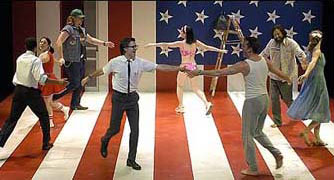 |
With an American flag as backdrop, this Mee/Bogart dance and theater piece is a stunning political fantasy, or a fantasmagorical political vision of America. The flag has light bulbs as stars, a hokey fixture for this pageant of archetypes and stereotypes of pop culture. The lights can't change the dark undertone.
A lively square dance, symbol of home-grown good fun for America's small towns. Except that "our town" turns out to be Los Alamos, the place where America lost its innocence. The all-American "Diamond's Pizza" delivery guy with the red plush case is psychotic, a manic depressive who has just committed the triple murder of his sister, her husband and their son.
All of that coexists with a fiftyish southern housewife as the center of U.S. civilization, a writer with a tattoo and blue jeans, a coed skater with a USA sweater, a black guy who wants to be loved, a comic lady who stuffs her mouth with cake, a derelict with an idea for a movie (well, why not?), and a couple, practicing sexual love by literally sliding on a plastic sheet splashed with gin, vermouth and olives.
And this is a generous view of America!
|
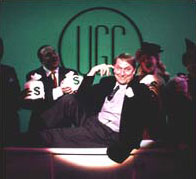 |
Why is it that serious criticism of America is more successful when it's outrageous satire? Can't audiences take it straight?
Bertold Brecht used satire to skewer economic plutocrats who oppressed the masses. As TV and newspaper pundits genuflect before corporate power, serious criticism is left to street protestors and satirists such as Kotis, who wrote the book, and Hollmann who co-authored the lyrics of this brilliant satire. They fill the political function Brecht did – they speak truth to power. The result is a wildly funny, political spoof that, for an added fillip, also parodies Broadway musicals with tunes that ranges from ersatz Kurt Weill to Les Miz.
There are a few adjustments for the times. Now the villains are not captains of industry, they're in the "service" business. And as theater-goers don't identify with traditional labor issues, the authors fantasize a universal crisis, a time when a dire water shortage (very believable) has led the government to ban private toilets and give control of public facilities to a greedy, gouging corporation. This is privatization to an absurd degree, which becomes increasingly believable in an era when Wall Street is plotting to "privatize," ie. loot, Social Security.
Kotis and Hollman leave no literary cliché unturned, and John Rando contributes the appropriately hokey direction. As the ragged, desperate souls line up outside the public convenience they cannot afford, Hope, daughter of the heartless capitalist, declares, "I never realized that such large, monopolizing corporations could be such a force for good in the world." She does, however, feel conflicted that she was sent to an expensive school to learn how to manipulate great masses of people.
The hero Bobby Strong stands up to the corporation. "What if the law is wrong?" Bobby muses. "Maybe we can find another way. We keep filling money bags with broken lives and dreams." "For 20 years," he says, "we've been waiting for the long-term solution that never came." Twenty years: since Reagan.
The corporate villain, a grimacing Caldwell B. Cladwell in a Chesterfield coat and top hat, expounds the familiar economic policy of "controlling consumption through the regulatory mechanism of cash." As the song says, "It's a privilege to pee." An obvious human right? Substitute "to see a doctor." There are also cops and senators who take payoffs and plan trips to Rio. The play carries the message of our time: You can either have power or be its victim.
|
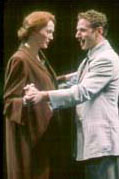 |
This story of political idealsim and betrayal is a fictional memoir of a communist family in Brooklyn Heights in the Cold War 1950s. Feiffer's older sister was a party member and he participated in the rallies described in the play – in defense of the Rosenbergs and about the Doctors' Plot, Stalin's accusation against Jewish doctors.
The audience takes their seats to the sound of Pete Seeger singing "Solidarity Forever," "Which Side Are You On" and "The Banks Were Made of Marble." There's a huge screen showing news headlines and an eerie picture of Stalin.
But curiously, this "realistic" drama seems less true to life than the absurd parodies of Mee and Kotis. The figures – Naomi, the hard-line Stalinist who can find no fault in the Russian rulers, and her compliant husband Shelly – are caricatures. Morty, Naomi's brother escapes to Hollywood to make movies and live in the real world of the dream world.
Emil, the inquisitive painter who hangs out on the Brooklyn Heights Esplanade and makes friends with young Rose, gives her Aldous Huxley's "Brave New World." How would that go over with her English teacher, "the Trotskyist," someone says. Actually, Trotskyists were anti-Stalinist, so the answer is counterintuitive.
There's a nasty edge here, and easy targets. When the "Doctors' plot" is exposed as a frame-up, Shelly who turns out to be no dummy decides that Stalin was planning a pogrom and Naomi becomes hysterical.
Finally, when the mystery unravels, it turns out Emil is the spy Col. Rudolf Abel. Just what is he doing hanging around on the Brooklyn Heights Esplanade talking to young girls? Perhaps Feiffer's problem was in trying to turn politics into family drama. That's often the case with writers who think that audiences will think that politics isn't enough.
Plays about foreign policy
|
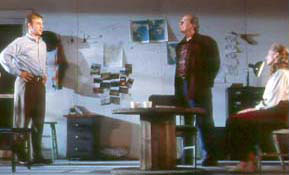 |
On the surface, Wilson seems the playwright of family drama and generational issues, yet, as he told me in an e-mail, "Most of my plays are deeply political." In his work, the personal transmogrifies into the political. "Rain Dance" takes on the morality of creating the atomic bomb, not something that's discussed much today, though of course the decision to countenance mass killing of adversaries is an essential element of recent U.S. foreign policy.
It's Los Alamos, July 1945, and the atomic bomb is about to be born. The set is a crude trailer office with file cabinets, a table made from a cable spooler, and a Coke machine. Those low-tech accoutrements are in stark contrast with the object of everyone's work. How do the people on the bomb team deal with their responsibility for it? The mundane events are subtly shadowed by the questions they largely dismiss or ignore. That is, as Wilson knows, the way most of the public reacts.
The issue is raised wordlessly by Tony, an Indian, who represents the trusteeship with nature that is being desecrated. He is having an affair with Irene, an artist who does drafts for the project and is married to a German project physicist, Peter Synder.
Watching it all is 27-year-old Hank, who signifies the future. Characters talk about the need for sacrifice and say "look to your children." Of course, they don't. The very ordinariness of their lives underscores the banality of the way in which decisions for the murderous weapon were undertaken.
|
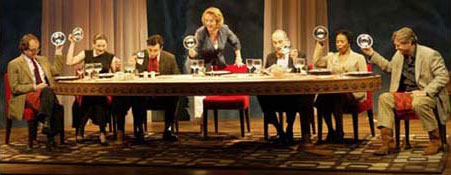 |
"Omnium Gatherum" is a very witty depiction of a dinner party from hell – which, by the way, is not a bad guess. At least, that must be the point of view of the Suzie the hostess, who is desperately trying to keep everyone elegantly fed and entertained while some of her trophy guests seem sooo unappreciative. Khalid, the Asian, recites the statistics of the world's poor, the detritus of globalization. A snooty literary fellow from Cambridge University downs copious glasses of wine while pontificating. A black minister confides that she gets her top-label no-label clothes at discount Loehmann's. Lydia, the nervous vegan, attacks global male narcissism.
Suzie is constantly running around filling glasses, perhaps achieving what one guest admits: "I drink to make other people interesting." They sit in their red plush chairs the length of the long table, before a backdrop of rough blue that seems ethereal – and are those stalactites protruding from around the chandelier?
They argue about peace and nuclear war, about Israel and the occupation, about peaceful protest. And terrorism. Just dinner party conversation, right? But a surprise guest named Mohammed helps (forces) everyone to take another look at definitions of political terrorism. Segue back, for example, to the weapon the protagonists of "Rain Dance" created. What is that familiar sound? Planes dropping bombs?
This dinner party is a modern day version of fiddling while Rome burned, and, in between the cleverness, the authors want to tell us that it's really almost too late. The ironic sound of "I've got the world on a string ..." reminds us of how tenuous that connection is.
|
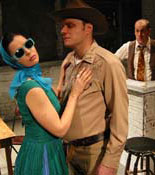 |
This political satire uses sado-masochistic sex as a metaphor for killer politics in the Middle East. In fact, almost everything – the set, the characters, the dialogue – is a metaphor. It is outrageous and very funny.
A grad student and would-be writer named Wanda doesn't have a place to live. She moves into a loft in the meat-packing district with a creepy poet professor, Brutus. After wine and dinner he ties her to a ladder and threatens her. He is Palestine, she is Israel. (One of her entrance cues is the theme from "Exodus.") She is rescued by a Texas cowboy named Frank (George Bush, of course) who has an English buddy called Watson (read Tony Blair.) Now Brutus will learn about humiliation.
In case you weren't sure about his politics, Shanley's playbill bio says: "John resides on Earth, in America, a country where the Democrats lost not only the Presidency, the House, and the Senate, but also their integrity, their credibility and their balls. Where Hillary Clinton voted to invade Iraq and Tom DeLay is considered to be a respectable man."
Plays about war
|
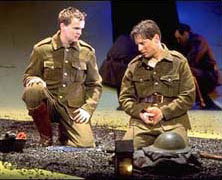 |
You can't get more political than plays about war. Interestingly, as this and other war plays show, the canon fodder of war tends to be working class.
And, at a time when the press is filled with reports about soldiers who are rallied to kill and be killed out of religious fanaticism, it's always good to remember that Muslims don't have the patent on that particular human predilection.
This 1985 play by Irishman Frank McGuinness, a Catholic nationalist, continues to be timely and achieves in the first act the goal of plumbing the emotions and motivations of the title characters, soldiers. In the latter "action-filled" acts, the play gets weighted down with stereotypes and doesn't fulfill its promise. Still, it keeps you on edge.
McGuiness wants Catholics to consider the humanity of Protestant soldiers, so he puts those troops in a war that rouses fewer emotions than the Irish conflict. They are in an Irish platoon in the British army in World War I. The play begins in 1969, when the group's only survivor, still marked by the old sorrow and angry at God, challenges the notion of God's chosen who turn out to be chosen for death.
In recalls up the induction center's wood barracks, army cots, and the boys who inhabited it – "naïve boys…cannon fodder ... in it for Ulster, their religion." Ironically, these soldiers hate the Sinn Fein more than they do the Germans. They make nasty anti-Catholic jokes. They volunteered to join the army in the hopes that would somehow help Ulster remain part of England.
They are mostly working class, toiling at a forge, working as a baker, a preacher. Only one comes from the privileged class and he has joined not out of religious fervor, but out of a wish to commit suicide.
Curiously, we never see any officers, as if these young men were totally on their own and the men who wield authority over them and sent them to die don't share their danger.
The doubts, terror and neurosis the soldiers show is effectively if somewhat melodramatically portrayed. They have a premonition they're not all coming back. They're right; they're in Flanders, and the Battle of the Somme, the bloodiest of the war, will occur the next day – July 1, 1916. Two soldiers roughhouse in a piggy-back re-enactment of a famous Protestant victory in 1690 during Protestant-Catholic wars at the time of King James.
McGuiness is saying, of course, that such pretentious macho posturing usually ends the same way: in the morning of the first day of battle, more than 5,000 men from the 7,000-member 36th Ulster Division were killed.
|
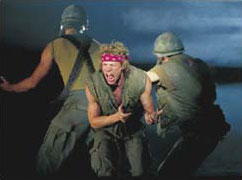 |
As in World War I, so in the Vietnam War. Does the public still need to be reminded that war destroys the fighters as well as the targets? Twyla Tharp's vibrant, moving, jazzy rock ballet follows five working-class youths in the 1960s who sign up for the Vietnam War as an act of patriotism and adventure. The three boys go to war, and they end up either dead or on drugs, disoriented and emotionally detached from each other and "normal" lives. The girls also pay an emotional price, and then there's the detritus of the Saigon "bar girls" that the U.S. Army considered appropriate R&R.
It's a brilliantly horrific war, with bullets as trajectories of light, helicopters whose noise sends them careening through the theater, and the sudden clammy, twists and contortions of the dead who are solemnly wrapped in plastic and numbered. Later they will arise in memory from the grave, reminding the survivors of how young were the victims of the slaughter ordered by the old men back home. Those who survive the horror almost envy the dead: having escaped from the war, they find body and spirit ravaged by drugs.
|
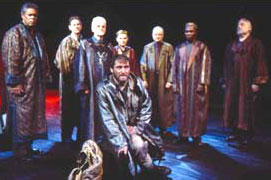 |
It is not surprising that this earliest surviving theater piece in Western literature is an anti-war play. It appears to have a loyal audience, but not enough converts.
In 490 B.C., the Persians launched an expedition against Athens, which had supported a rebellion against Persian domination of the Greek cities. The Persians controlled most of the world then – Asia Minor and the Middle East. The Athenians defeated the Persians at Marathon, the most important battle in Greek history. Then Persian King Xerxes in 481 B.C. organized an army of 150,000 and a fleet of 600 to conquer those daring dissidents. In alliance with Sparta, which ran the army, Athens built a navy of 200 ships. And in 479, off Salamis in the Aegean Sea, Athens' naval force destroyed the Persian fleet, forcing the invaders' troops to withdraw.
Aeschylus fought in the battle of Marathon and wrote this play 11 years later. This is a striking, vivid production. It is Susa, the Persian capital, after the defeat of Salamis. In the Council Hall, news is awaited by the wealthy elders in their satin robes and the pitiless, arrogant Queen Attosa, Xerxes' mother, in a crown so heavy with gold she seems to have difficulty moving.
They think, "Defeat is impossible. Defeat is unthinkable. We have always been the favorites of fate. Fortune has cupped us in her golden palms. It has only been a matter of choosing our desire. Which fruit to pick from the nodding tree." But then, the question: "Might we go too far…with our brazen confidence."
They learn the truth when Xerxes, the last survivor, straggles home, bloody, wearing an Afghan wool hat and army boots. He evokes quiet tragedy and desperate sadness. He tells of the horrors of battle in words that quickly conjure up the military adventures of the United States.
Then the question: "Were they right to send boys into peril pursuing their old men dreams?" Xerxes wrecked destruction when he mistook power for being divine. The final question: "How could we have thought that such a desecration of the earth could please the gods."
Plays about race, set in the early 20th century
|
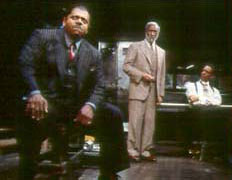 |
Wilson has devoted his career to telling the black experience decade by decade. "Ma Rainey" was his earliest work: the others are "Jitney," "Fences," "Joe Turner," "Piano Lesson," "Two Trains Running," "Seven Guitars" and "King Hedley II".
At a blues recording session Chicago in 1927 – the jazz-age – the divide is represented by the upstairs of the white record producer and agent and the downstairs practice and locker room of the black musicians. Ma Rainey, so famous that she can swagger in fur and power, is still manipulated by the whites.
In the course of the practice, the musicians express their frustrations. Levee, who speaks in cadences of fury, tells about the rape of his mother in the South. They all riff on the exploitation they experience as blacks, alternating by dialogue and the music that tells it mournfully. It is a play of blues in text. That's a common idiom for black plays, including the next one.
|
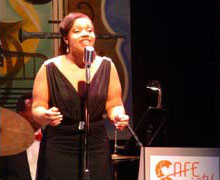 |
In 1939, Barney Josephson, a shoe salesman from New Jersey, opened a jazz café in a basement at 2 Sheridan Square in Greenwich Village. Things hadn't gotten much better for black musicians since the time of Ma Rainey. Barney's idea was rather audacious: the first integrated audience, a stark contrast to the famous Stork Club and El Morocco. With his friend Clare Booth Luce, aiming a dig at the rich idlers then called "café society," he ironically named the club after, with the sobriquet, "The wrong place for the right people." It was a place, he said, "where blacks and whites worked together behind the footlights and sat together out front."
This play is an exhilarating re-creation of the opening night, with the stage transformed into a cabaret and some of the audience invited to sit at onstage tables. It's a pungent mix of jazz and politics. Josephson has just come back from HUAC (the witch-hunting House Un-American Activities Committee) where a beady-eyed lawyer threatens to block the opening and he is worried that he won't get his cabaret license in time.
The entertainers wander into the club, stand around the bar, talk about the realities of race and politics, worry about getting the license, which finally of course arrives. And we settle back for a sumptuous song fest. Billie Holiday does "Strange Fruit" for the first time. Others portrayed by an amazingly talented cast include John White, Lena Horne, Joe Turner, Dick Haymes and Sarah Vaughn. Their run was nearly 20 years. This production deserves a reprise.
|
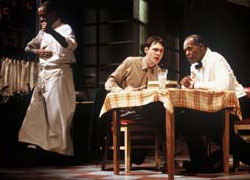 |
This play finds human drama in the prosaic antics of Hally, a nervous young black man learning to dance, Willie, a skittish young white man railing at his father, and Sam, an older black attempting to encourage and calm them both. While it takes place in South Africa, it could have been the American South.
It is 1950 in East London, the Eastern Province. The racism that Fugard describes is so ingrained that it even infects Hally, who since he was 10 has spent all his free hours with Sam, looking him as a surrogate father preferable to his own drunken one. Willie is at Port Elizabeth Technical College and pretends to intellectual discourse, but he can't translate his own experience to understanding the situation of blacks.
Dismissing the caning of blacks, he insists there's progress. "Joan of Arc if she was captured today, she'd be given a fair trial." And Sam adds, "Then she'd be executed." Hally puts down "social reformers." As the rain pounds outside, Sam and Willie clean up Hally's parents' luncheonette and Willie practices dance steps, which becomes a metaphor for people and countries bumping into each other. And as in "Ma Rainey," the so-called "friend" of the blacks turns out to be false.
Plays about race, set mid-century to the present
|
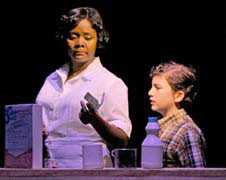 |
Kushner's engaging folk opera illuminates the ironic disconnect between preaching and practice by white liberals who manage to rationalize paying the "underclass" low wages while cooing about their sensitivity to repression. It is a memoir of the author's own Lake Charles, La., 1960s childhood. The story's maid is his family's maid, and the young boy a combination of Kushner and his brother. In the background is the burgeoning civil rights movement.
At 39 with four kids to raise, Caroline's sound is gospel laced with pain. Twenty-two years as a cleaner making $30 a week in the early 1960s will do that to you. Just how much she needs money is demonstrated, albeit in a rather hokey manner. Her employer Rose, annoyed that stepson Noah, 8, leaves change in pockets of pants dropped in the laundry basket, tells her she can keep the cash. It's a moral conundrum for a church-goer who lives the gospels.
But those gospels don't seem to take her far enough. She's lonely, and her teenage daughter is rebellious and challenging: "Teach me what you know about how to keep your head tucked low." One of Caroline's friends is going to college where students have joined the civil rights movement. Some churches – not the head-tucked-low kind – would lead that rebellion. And what are liberal whites doing? Rose's father, a '30s leftist, intones while giving Noah "Chanukah gelt" that "it's ripped from a starving person's mouth." Yes, these are Jewish liberals. But Kushner seems to wonder, what good did that do Caroline?
It's really not the clinking round change that matters, but what Rose's father knows: "The South is in a might frenzy! The old world's ending! Negroes marching! Change is coming!" Not for Caroline, but for her daughter.
|
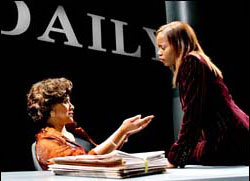 |
Segue to a few decades later. Blacks are still struggling, and there are still some well-meaning whites, but the playing field is different. It was inspired by the story of Janet Cooke, the Washington Post reporter who in 1980 made up a story about a heroin-addicted ghetto kid. Yvonne, ambitious and edgy, is racing up the ladder as a journalist, rather contemptuous of older colleagues who seem to her to be plodding along in the "black" section, "Outlook."
She gets caught up in a story about some black kids who maybe killed a liberal white teacher who was driving with his wife to a restaurant in a black neighborhood. He was heir to an oil fortune, but the couple taught in the "inner city" because they believed in it, and he was taking his parents there to show it was OK. Yvonne is also pretty liberal. Her boyfriend is white. A female hood named Latitia cons her into thinking she or maybe a girl gang did the killing. You'd think Yvonne could smell a con; after all, she's fooled people into thinking she went to Harvard and the Sorbonne.
This play is so full of glaring hard-edged stereotypes, or stylized hokum and so bereft of real people, so full of quick shifts in action, you think you're watching television. Race has indeed become a staple of TV, but that doesn't make it theater art.
|
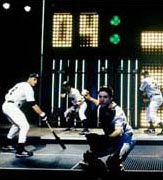 |
This riveting play touches a lot of bases. The protagonist is black and gay so is this about race or sex? It is subtle and too complex to fit into easy boxes.
Champion outfielder Darren Lemming calls a press conference to announce that he is gay. Later, a southern racist relief pitcher, Shane Mungitt, tells the media, "I don't mind the colored people, the gooks an' the spics an' the coons an' like that. But every night t'have'ta take a shower with a faggot!?" Mungitt is an uneducated poor white and excruciatingly naïve about how to talk to the press. So, let's add "class" to the mix of issues.
Lemming's best friend, Davey Battle, a black on another team, is equally repelled by the revelation – he thinks it's ungodly.
Mungitt is banned from play, then apologizes publicly, but is taunted by Lemming who gropes him in the shower. Battle ends up the victim when the infuriated Mungitt throws a killer fastball. So, where is virtue and guilt here? Maybe there are shades of gray, which is what the real world is usually like, anyway.
Plays about class, which are also often about race or "ethnicity"
|
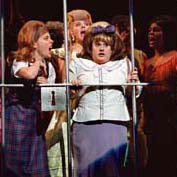 |
This is a stirring show for anyone who remembers the civil rights movement of the 1960s. It's Baltimore 1962. The heroine is not only trying to get her own chubby self onto a Baltimore TV teen bandstand show, but she's trying to integrate it. Maryland forty years ago was South.
It took me back to that era when I was arrested on the eastern shore of the state (even worse than Baltimore) with black and white students waging a campaign to integrate white-only restaurants. I wonder if younger people who like "Hairspray" for its over-the-top script and clanging music have any sense of how real and important the story is.That narrative sneaks in under a pop-culture-friendly campy rock musical. Tracy, a working-class teen wants to get on a local TV program run by racist, snobbish Velma Von Tussle, whose main goal is pushing her equally stuck-up, high-pitched daughter, Amber, into a match with the local heart-throb, Link Larkin. Tracy has a crush on Elvis-wannabe Link.
But as much as she wants to be on the show and is mad for Link, Tracy thinks the teen bandstand, and the rest of Baltimore, ought to be integrated. She's willing to put everything on the line to fight for it. She's denounced as a communist and even hustled off to jail. The irony is that the white kids were dancing to black music.
"Hairspray" challenges the notion of glamour. The heroes are not rich and thin; they are working-class and overweight. Tracy dresses totally wrong for her shape in a white ruffled blouse and too-tight short blue skirt.
There's some edgy comedy. Seaweed, a black youth who can't undo the rope with which a frantic white mom tied her daughter to the bed, deftly pulls out a switch blade. But there's also reality: the militant black lady, Motormouth Maybelle, sings a stirring gospel, "There's a light in the Darkness."
"Hairspray" makes one happy to see beehives again.
|
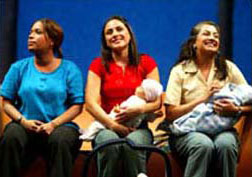 |
Plays about race are often about class; so are plays about Hispanics. This is a smart, funny, biting satire of what happens when nervous middle class liberals hire Hispanic women to care for their kids.
"Everyone's from El Salvador. What happened to all the Mexicans!?" declares the nervous middle-class Los Angeles mom who's interviewing a nanny. That line perfectly represents the collective lens with which Loomer thinks Anglo Americans view Latinos. They are not individuals, but part of a south-of-the-border mass. In this funny-sad-true play, the misfortunes suffered by often undocumented Latinos seem as inevitable as those of classic tragedies.The heroine is Ana Hernandez, whose husband Bobby, a day construction worker, was a Salvadoran guerrilla at 15 and hasn't been able to get the papers he needs for a regular job. Ana went to school to be a dentist, but couldn't finish because of the war. So, but for fate and the U.S. government and military, Bobby might not have wasted his teen years as a soldier and Ana might be as middle class as the people who hire her.
Ana has one son in L.A. and another living with his grandmother in El Salvador; she's saving to bring him to the U.S. She gets a new job caring for an infant, having learned after two rejections that she can't reveal her L.A. son to prospective employers since they don't want another child to ever take priority over their own kids.
These employers, the Robins, are "liberal." Nancy is a lawyer for a studio; Richard a public defender, "working for the people." Naturally, they live in the liberal enclave of Santa Monica. So why is Nancy setting up a "nanny cam" inside a teddy bear to spy on Ana? Richard protests, "I'm married to Linda Tripp!" She's not quite as bad as her "park" friends, who pull tricks like leaving dollars bills around to see if any go missing.
The Anglos insist that nannies put aside their own personal needs and be on instantaneous call. And that's when you stop laughing.
|
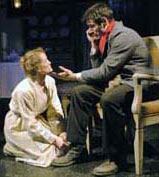 |
Lawrence's play about the travails of working-class mining families near Nottingham in the early part of the last century reflects the strong politics of a man who was a defender of the rights of labor and women. He was the son of a miner and as a young man lived in the kind of mill town the play describes. Though written in 1912, it wasn't produced until 1967 when it was staged by the Royal Court in London.
The mood is set by the comment of Mrs. Purdy, whose husband worked 50 years, was injured, and then was cast off to a low-paid job. "It's a wonder they let us live on the face of the earth at all!" she declares. There is a national coal-mining strike under way – an event that indeed happened in that year – that exacerbates the tensions.
It's not only class conflict but sexism that imposes itself, making these workers suffer cruelty not only from poverty and from their bosses but from each other. Luther, who has gotten Mrs. Purdy's young daughter pregnant, has just married Minnie, a former governess with some savings. Mrs. Purdy wants money for her Bertha.
Lawrence shows how the stereotypes of sex roles hamstring husband and wife. Minnie is an assertive woman striving for a better life, but her ambition is circumscribed by the power of men and the limitations of class.
So, she proposes to Luther. But her new husband is beaten down, passive; she blames his selfish, domineering mother, Mrs. Gascoyne. Minnie wants him to show gumption, but she comes across as a nag. In the end, Minnie is clever enough to manipulate the situation into making Luther feel her dependence.
The feelings expressed are powerful and sharp, not sentimental, and they are overtly feminist, with various women commenting: "Any woman who builds her life on man builds on something that will sooner or later bring the house down." "Men is trouble, pure and simple." And, "Whatever the men do, the women must make up for it." Maybe that's why it took 55 years for it to be produced.
Plays about foreign struggles
|
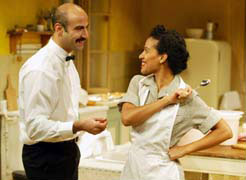 |
The interaction of masters and servants ought to put the political class system in relief. The Cuban revolution is a cauldron for such works.
In "The Cook," as happens in real life, class consciousness is not universal – at least not among the lower class. The nervous rich lady decked out in ball gown and diamond necklace for New Year's Eve 1958 knows her class interests. That's why she is about to flee the advent of Fidel Castro, who arrived in Havana on Jan. 1, 1959.
But Gladys the cook is so enraptured of her métier and so devoted to her bosses, that she chides her chauffeur husband, Carlos, a militant who seethes at the foreign domination of Cuba. Gladys vows to take care of the old mansion till her mistress returns. Carlos is also pretty passionate, and she fends him off when she's cooking.
Perhaps this is required these days for Miami audiences, but Machado presents a simplistic vision of Carlos 12 years later as an obnoxious Castroite who has become sub-minister of transportation. There's no logic in the progression, as Carlos is not shown earlier as an opportunist, but perhaps Machado thinks that the transformation is inevitable. Gladys won't sleep with Carlos – it's not stated why – so he takes a mistress. Cousin Julio is now openly swishy and, in a scene that seems endless, he pouts and hides from arrest. Sometimes, less is more when more is soap opera.
Years later, the gray-haired and slightly doddering couple survives by running a private restaurant in the old mansion. Gladys still feels affection to the mistress she hasn't seen in decades, but through an odd quirk of fate, she discovers – surprise – how little the rich exiles cared about the servants they left behind.
|
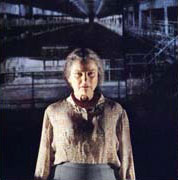 |
This is a riveting political thriller. Machine guns and fighter plane sounds reverberate through the theater, and "Golda Meier," hunched over a plain wood table with her cigarettes and a Milwaukee accent, races back to the 1973 Yom Kippur war to reveal details that have never till before been reported.
The play flashes through Golda's life from youth to retirement, with a personal life that took second-place to the political one. It is based on hours of interviews author Gibson had with her over eight months in 1977, the year before her death, and on evidence he found in documents.
The stunning dramatic center is built around the Israelis' secret construction of a nuclear weapon and Golda's threat to use it during the Yom Kippur War. Nixon had promised the Israelis 48 Phantom warplanes and arms. But after the Arab invasion, the U.S. balked: Henry Kissinger wanted Israel to give back the lands it had taken in the 1967 war.
With the war going disastrously wrong for Israel, Golda is conferring by phone with her cabinet. She has Israeli ambassador to Washington Simcha Dinitz wake Kissinger and tell him that nuclear bombs are targeting the military headquarters of Egypt and Syria. Golda can order the launching of "the temple weapon."
Temple weapon? It's a reference to the destruction of the past temples in Jerusalem and the pledge that Israelis would not let it happen again. After the failed, British-French-Israeli invasion of Suez in 1956, (an attempt to prevent Egyptian President Nasser from nationalizing the Suez Canal), the French agreed to help the Israelis build a nuclear reactor. Hundreds of feet underground in the Negev desert at Dimona, the Israelis processed uranium to get plutonium for 25 nuclear warheads.
Golda wonders, if Israel dropped the bomb on Arab capitals, would the Soviets then bomb Tel Aviv? Would the U.S. bomb Moscow? And Moscow, New York? They are said as almost throw-away lines.
The U.S. agrees to resupply Israel. When London and Paris won't let the planes land, they are refueled in air. Later, Kissinger would tell Golda, "You blackmailed us." This is fascinating history and a mesmerizing piece of theater.
|
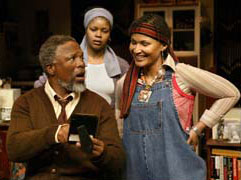 |
This play about South African blacks plumbs the notion of personal and political justice after the victory over apartheid. Shouldn't those who sacrificed get their due and those who did evil be punished? It's a strong political message.
Sipho Makhaya was one of thousands of low-level toilers in the black struggle, while his brother, an important militant, had an easier life in exile in London. Sipho, now 63, raised his daughter from infancy after his wife left them. Still a charmer, he has become nervous, tight, angry. His brother, who died recently, got money, women and fame while Sipho at 63 – who for years really ran the Port Elizabeth Library – can't get recognition and promotion as chief librarian for the two years before his retirement. It goes to a younger fellow. Where is justice?
And where is justice on the larger level? Sipho's son, a poet, was killed at the funeral of a little girl. It's not stated here, but South Africans will guess the circumstance. Commonly, the funerals of victims of apartheid killings became political protests which, in turn, were often targets of apartheid regime killers. Sipho wants the murderer tried and punished. His brother's daughter, Mandisa MacKay, is back home with his ashes and argues against amnesty. But Sipho's daughter Thando takes a stand for reconciliation. If Mandela can forgive the men who sent the parcel bomb that killed Joe Slovo's wife and children, so can she. Slovo was a white Communist and activist in the African National Congress.
These are matters South Africans are arguing today, and Kani is smart to subtly mix the personal and the political. The surprise denouement is that Sipho must forgive his brother as well as the whites. It's the South African politics of reconciliation.
![]()
Winter 2003 Theater Section | Winter 2003 Main Page
Current Theater Section | Current Home Page
Copyright ©
Reprinted by permission of author, who retains all copyright and control.